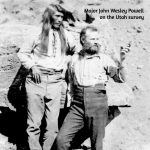
Though the water running in the fountain be every one’s,
yet who can doubt, but that in the pitcher
is his only who drew it out?
His labour hath taken it out of the hands of nature,
where it was common, and belonged equally to all her children,
and hath thereby appropriated it to himself.– John Locke, from Second Treatise of Government
Decision-making about the parlous Colorado River situation is currently somewhat hung up in a surly debate about the absolute ‘rule of law’ versus the kind of equity and fairness most laws are created to further. Six of the seven Colorado River states are willing to take proportional shares of the pain for some major cuts in water usage that must happen for the river system to remain functional. But the seventh state, California, insists that the pain be administered strictly according to the foundational law of the river basin, the appropriation law, whereby junior water users bear all the pain before any falls on more senior users.
Thus we Westerners – all Americans actually – are edging ever closer to the time when we will have to confront the continuing viability of laws based on appropriation from the commons, once a commons has been entirely appropriated.
Appropriation law gives individual members of a society permission to convert portions of the land and resources they inhabit in common into private property, through the act of applying their individual labor to the development of that part of the land and its resources. This concept of privatization through individual appropriation from the commons led in America to the fundamental doctrines driving the expansion of Anglo-European civilization into its ‘New World’: the homesteading laws, the laws for appropriating water in water-scarce regions, and the 1872 Mining Law among them. These all came into being down on the ground as common law worked out by settlers and ‘unsettlers’ of European origin – often aggressively and violently – rather than executed as a top-down public policy governing development from the start. The formal laws were only executed after the basic practices of ‘first come first served’ appropriation had been established down on the ground.
There was, of course, a tendency to think of this ‘first come first served’ doctrine as ‘natural law,’ human nature, just the way the species does things. But anthropologists who have studied primary cultures – the remaining hunter-gatherer groups like we all descended from – tell us a different story. For hunter-gatherer bands, the idea that the land and its essential resources could be appropriated by individual members and privatized (No trespassing!) was literally inconceivable. The fruits of the land, the ‘goods and services’ naturally produced from the local ecosystems, were everyone’s for the taking, so long as you only took what you could use. But the land and its production systems themselves belonged to all and none.
They probably intuitively understood the concept of territory – the amount of land their group needed for their subsistence living – and chased off encroaching members of other bands, like wolves peeing on their boundaries. But within the territory, within the band, the idea that an individual member might appropriate for himself, say, the land surrounding the spring where the deer drank, or the big berry patch… simply inconceivable.
So how did we get from there – the aboriginal communal economy in which all equitably got what they needed from the commons without ‘owning’ any of it – to the current situation where most of the former commons (land, water and other resources) has been surveyed off into ‘properties’ privately owned by individuals, with subsequent generations having to work for the propertied class in order to get the wherewithal to buy or trade for what they need of those appropriated resources?
That is a question that has been slowly coming to a boil for the past six or eight thousand years, and the anthropologists, archaeologists and social scientists have not put together a really definitive answer. But there was one period in Anglo-European history when serious, if naive, attempts were made to apply reason to that question; and those attempts in that period, for better or worse, laid the philosophical foundation for the political and economic infrastructure of the American Experiment – including the concept of converting the commons into private property through appropriation.
This period was ‘The Enlightenment’ in the 17th and 18th centuries C.E., which followed fast on the heels of the Scientific Revolution in which such luminaries as Francis Bacon and Isaac Newton had put the disciplined, evidence-based search for knowledge on at least an equal footing with the revelations of religion. The Enlightenment philosophes took the scientific quest for evidence-based knowledge into the more ambiguous realm of explaining the social, economic and political infrastructure of society – or maybe more accurately: justifying the infrastructure of their own society, hardly a model of equity and fairness to all.
The philosophes tried, with no anthropological guidance beyond the Bible’s Old Testament stories, to go back to the ‘natural’ origins of human society, where they assumed that the basic social unit was what it had become by their time: the individual. To keep an agglutination of rugged individualists from what the English philosopher Thomas Hobbes had imagined as ‘the war of each against all,’ leading to a ‘solitary, poor, brutish, and short’ life for everyone except the last man standing, the philosophes conceived of the ‘social contract’ whereby each individual agreed to respect the life, liberty and property of every other participant in a ‘contract society,’ if all the others would do the same.
Had the philosophes seriously followed Bacon’s new scientific method, a more objective look at the native populations of the ‘New World’ would have taught them that the original social unit that close to nature was the group, not the individual. Individuals in a native band could become known within their society by their work, but the idea of a making an individual contract with their society was again inconceivable; they were born into their society, grew up taking it for granted; they were their society, and without it they were nothing; they took their identity from their society. It was a significant distinction: in the aboriginal communal society, the individual was nothing without the society; whereas, for the philosophes’ contract society, the society was nothing without the consent and participation of its individuals.
A clear-eyed look at any modern society shows a generally confusing mix of both residual ‘communities’ (evangelical and Catholic churches, fraternal unions, teams, many small villages, and other organizations whose members would willingly die with or for each other), and the dominant ‘contract societies’ (participants in economic exchanges for goods and services, schools, many Protestant churches, most suburbs, and other groups in which the participant remains an individual with a purposeful but limited investment of oneself). A tendency in most of us to develop ‘favorites’ in our economic dealings – going back to the same stores, restaurants, bars et cetera because we like the people there, even though another establishment down the street tries to lure us in with lower prices – suggests that the ‘community’ is a more ‘natural’ and desired state for humans than the ‘contract society’ – which in turn suggests (as Yuval Harari argues in Sapiens) that the road from hunter-gatherer peoples to civilizations is not necessarily an ‘ascent,’ at least in terms of human satisfaction.
Real anthropology, however, was not really the purpose of John Locke, Jean-Jacues Rousseau, Voltaire and the other philosophes; they had the larger mission of justifying a world increasingly driven by individuals operating on their own and hauling the society along with them – the early industrialists and global merchants tugging the decayed, overgrown and overcrowded feudal agricultural societies into the urbanizing mass society reorganized as a contract society, with the contracting workers organized in industrial systems managed by educated elites. Many of the early industrial workers were driven off the land they had farmed for generations as vassals under contracts with the lords of their places, who suddenly found it more profitable to ‘enclose’ their land to graze sheep for wool for the mills springing up in the new more ‘civilized’ economy.
That kind of privatization of land, displacing thousands of people, required some explanation and justification. John Locke attempted this in his ‘Second Treatise on Government,’ subtitled ‘An Essay Concerning the True Original, Extent and End of Civil Government.’ After established the need for the ‘social contract’ in the first chapters, he ventured into a longish chapter titled ‘Of Property,’ where he poses the problem: God having given the earth to ‘the children of men’ in common, how should any one ever come to have a property in any thing?
He goes into a long and somewhat convoluted argument, ‘proving’ to at least his own satisfaction that when a man had added his labor to any thing from the commons given to all, that thing became his property. Apples or nuts he harvested become his – so long as he takes only what he can use; if he takes anything that rots or otherwise wastes away because he was unable to use it, then he has taken property from his neighbors.
That might have gotten a dubious nod from a hunter-gatherer band, or at least a shrug. They’d been doing that forever, although not calling it ‘property’ – whatever fills your basket. But putting the appropriation in the context of individuals getting it for themselves (with an undertone of competition among neighbors) was really quite different from the community context of everyone hunting and gathering for the band’s common pots. Rituals existed around the giving-away of choice meats when the hunts were successful.
Locke then took a giant leap in going from ‘property’ created by just picking up apples and nuts, or dipping a pitcher of water – harvesting the existing fruits of nature – to appropriating property in land. ‘The same measures governed the appropriation of land too: whatsoever he tilled and reaped, laid up and made use of, that was his peculiar right; whatsoever he enclosed, and could feed, and make use of, the cattle and product was also his.’ So long as nothing he grew or raised spoiled before he could use it.
The problem thwarting the accumulation of real wealth in property by individuals was spoilage, waste. But what if there were something that didn’t rot or waste away? Like shells, or shiny bits of metal…. One could trade one’s excess apples or nuts for those durable shiny bits of metal, which could then be traded whenever to others for their excessive appropriations that would otherwise rot or waste away…. Thus did money enter the system, and it enabled virtually unlimited appropriation and accumulation of ‘property,’ so long as markets existed for exchanging those shiny bits for more perishable goods and services.
That, in a nutshell, is Locke’s theory of labor in the creation of property, something that anyone could do, rich or poor, so long as he had the energy and will to put his labor to work appropriating the property from the commons – and so long as there was a commons from which to appropriate.
By Locke’s time, of course, the Anglo-European peoples had succeeded so well as a dominant species in their lands that no land or traditional resources were left to appropriate. By the 15th century C.E. they were approaching a serious energy crisis – wood for burning and hay for horses being their principal energy resources – and were on the cusp of having too many people for the food supply. This precipitated the early stage of reorganizing as a ‘civilization,’ to do what civilizations do: they began to expand, through occupation of new lands where possible, conquest when necessary. Ships of explorers going out with guns, germs and steel – hit a bonanza; they ‘discovered’ America.
Locke acknowledged that the absence of commons remaining in England and Europe was problematic for new generations wanting to create their own property – but there was a whole New World across the ocean! ‘In the beginning all the world was America,’ he observed, and America was apparently huge and perhaps infinite in its resources (still a fairly common belief, or hope)….
The Enlightenment thinkers had a significant influence on the development of American social, political and economic society; the concept of the social contract and the contract society figured largely in both the American break from English governance and in the civil government set up following the American Revolution – which was as much a civil war as it was a war between nations, with early American industrialists fighting for freedom from British mercantilism, and agrarian farmers fighting for freedom from both the British mercantilists and the American industrialists who controlled the flow of those durable shiny bits of metal. Shay’s Rebellion and the Whiskey Rebellion in the years following the end of the revolt against Great Britain might be considered part of the American Revolution.
The American system of appropriating land from the commons tried to merge with the Enlightenment idea of the individual (Jefferson’s ‘yeoman’) as the basic societal unit, and this did not work out all that well. Two out every three homesteads appropriated from the commons failed, and most of the ones that succeeded were done by groups of settlers, often religious groups, settling an area together, especially in the arid West – as Major John Wesley Powell had recommended in his 1877 ‘Report on the Lands of the Arid Region.’
Powell in turn had based his recommendations on the Hispanic-Mexican system of settlement, which permitted no wide-open individual appropriation from the commons; land grants were only issued to groups of settlers committed to working together to develop an area with some ecological sensibility. But Powell’s recommendations were, as usual, ignored. From the perspective of the leaders of industrial society, appropriation from the commons by individuals was preferable to appropriation for community settlements because of the failure rate: homesteaders who failed became a source of workers for western industries, and those managing industrial operations preferred employees who thought of themselves as independent individuals contracting for themselves, as opposed to the ‘socialists’ trying to organize the workers.
While the 17th century Scientific Revolution and the ensuing Enlightenment gave much to the modern society, it also produced quite a lot of questionable ideas that were clearly the product of cloistered thinkers from favored economic classes who operated from questionable assumptions about what was really ‘human nature’ – and this included America’s ‘founding brothers’ on the west side of the ocean, an equally favored class for the most part. ‘Individualism’ may be an ephemeral luxury that only the wealthier classes in a wealthy society can really afford.
John Locke’s naive ideas about individualistic appropriation from the commons were given – as he acknowledged – new life by the occupation and parceling out of a vast new continental commons (originally appropriated from its aboriginal inhabitants), but now that continent and its waters and other resources are almost entirely appropriated – and the next time the Republicans are in charge they will try to finish off the privatization of the remaining public lands and their resources.
Now we find ourselves facing the question that all unsustainable processes eventually face: what next? A question of some urgency in the Colorado River region, where fairness decrees that Lockean appropriation law can neither be just abandoned nor enforced to the letter of the law. More on this as it unravels further….




Thanks for your insights, George. Certainly, a difficult issue where few are likely to be satisfied with the outcomes.
Alas, we have left the Age of Enlightenment and returned to the dark ages in terms of science and knowledge. It was once hoped we could be enlightened and humane and appreciate both science and literature. I am bereft.
Thanks, George, for another interesting essay. I’m a fan of Harari’s too, and the section you referenced in “Sapiens” is fascinating–he claims that greater satisfaction existed for the masses in the hunter-gatherer culture than for the laborers in the supposedly “advanced” agricultural and industrial societies that followed.
Getting back to our river, confusion is growing. The Denver Post has published at least a couple of articles on new Native American demands for their nations’ water rights. And the 10-year drought in California is “over” (maybe) and their reservoirs are filling.
Best to you,
Paula
Harari makes his point well about agricultural and industrial societies being more and harder work than the hunter-gatherer life, but seems to think it was just a bad choice rather than something forced on the early peoples by population expansion…. I hope anthropologists, archaeologists and other social scientists will be able to make that transition more transparent. The ‘civilized’ perspective is that the species just ‘outgrew’ the hunter-gatherer phase psychologically and culturally; my intuition is that we outgrew it physically and numerically, to where we had to invent new cultural ways of feeding ourselves and living with ever-closer neighbors, but our psyches – and probably our brains – are still out there wandering the vast plains and valleys of a planet more filled with wonder than with people…. Humankind may not have ‘fallen,’ in other words, but may have been pushed….
Next post – time to start exploring the Native American issue…. Thanks for your response.
Fascinating, George. Keep going.
Fondly, gerry ( reese)
Going where? Sometimes it’s hard to find one’s way back from the ‘dark and backward abyss of time,’ like someone said. Anyway I hope the point is made, that the privatization of appropriations from the commons is not ‘natural’ but is cultural. Easier to change human culture than human nature.
I wouldn’t even try to argue against the platform you lay down in this posting, George. You have made a good case right up to the point when you bring up the Republicans being the ones to finally tip the cart all the way over. That is when it just became silly. I am not a Republican and I would never give them credit for having that much power, especially when I see how thoroughly the Democrats fuck things up. I am more of the persuasion that we need to raise our awareness and consciousness beyond politics, religion and economics and learn to usher in the new paradigm of unity, and mutual aid. The old ways are collapsing. Politics, especially, needs to die for it is nothing but a source of argument and division. There are no good guys in any of it. Time to let it go. The answers will never come from divisiveness.
It’s not partisan to state facts.
“In the latest chapter in this battle, Republicans have launched an all-out assault on the ability to protect new public lands. In House Bill 1459, House Republicans are seeking to remove the President’s power to create new national parks. The bill has become known as the “No New Public Parks” Bill.
“However, Republican members of Congress for decades have tried to shut down the creation of new national parks. After Franklin Roosevelt created Jackson Hole National Park, Republicans passed a 1950 law that banned the creation of any new national park in Wyoming without congressional approval. After President Carter used the law in 1978 to protect Alaskan wilderness, Congress passed a law that prevented the President from creating new national monuments in Alaska. Traditionally, Western Republicans have their campaigns financed by industries that want to use public land for profit and have been eager to protect the interests of their donors.”
This is from https://democracyjournal.org/arguments/the-gop-vs-our-national-parks/
Thank you for that additional – and new – information. Ironic that it was a Republican, Theodore Roosevelt, who really set the bar for protecting some of the remaining commons from wholesale appropriation and privatization, but the rest of the party never stops trying….
Shades of William Blake’s “Mock On, Mock on, Voltaire, Rousseu”, where Blake concludes that, “…”tis all in vain! You throw the sand against the wind, and the wind blows it back again.” A modern poet dares to say, “the answer, my friend, is blowing in the wind.” It’s mostly a protest song about peace and war and freedom, but it has undertones that relate to the topic you develop here. And like Bob Dylan’s song, the answer is either so obvious that it’s right in our face, or it is as intangible as the wind. Looking forward to your next esssay on the topic!
George, you are on to something. Don’t quit. It does seem like we have reached the time where we have to make the big decisions facing humanity and the right to earth’s resources – the commons. If we don’t share, we are doomed. (How can California keep 6 other states at bay?)
The six states have always been aware of – and maybe too intimidated by – the fact that California has half again more representatives in Congress than the six states combined. We should probably trade more on the fact that ‘Caliphobia’ isn’t just a southwestern phenomenon.
Thank you George. I was continously reminded of my state of Iowa–where the promotion of individual control over ag land has led to adverse health effects to water and land; also known as externalization of costs.
Thanks for a Midwestern perspective. I’ve often thought a study quantifying externalized costs for corporate and other large operations, then comparing those costs to profits claimed by the operations, would match up….
Beautiful again! I think you have just written the next chapter of my book, on how to manage our species the next thousands of years (assuming we have that much time)